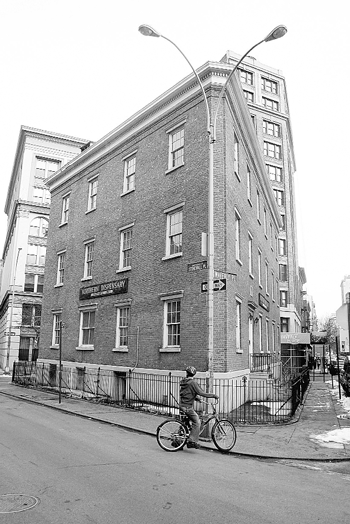By Alex Schmidt
As Manhattan’s grid begins to give way to a jumble of old Village streets west of Sixth Ave., Waverly Pl. turns from east-west to northwest. For a tiny stretch until it hits southeast-running Grove St., however, Waverly Pl. also continues on its east-west path, forming a small three-sided space bounded by the fork of Waverly Pl. on two sides and Grove and Christopher Sts. on the other. A three-sided building, the Northern Dispensary, occupies that triangle. It stands, filled with dust and rusting dental equipment, on the border between the colossal vertical development of the city that necessitated 90-degree angles, and the organic streets of Greenwich Village’s stout provincial past.
“It’s a beautiful building, it’s unique, right in the heart of the Village. We think it should be used for some social purpose and we’d like to play a part in that,” said Roy Leavitt of Greenwich House. “We’ve been unsuccessful so far.”
The Northern Dispensary has been vacant since 1998, when real estate investor William Gottlieb purchased it. Recently, Leavitt attempted to get in touch with Gottlieb’s heirs to determine whether they would like to do something with the Northern Dispensary. They even contacted a Gottlieb representative at Ernst & Young financial and real estate firm to no avail.
“There appears to be no easy way to contact anybody who is in a position to speak about the building’s future,” Leavitt said.
The building’s original deed restriction states it must be used to serve the “worthy poor.”
This is typical of Gottlieb’s style, which lives on even though Gottlieb himself passed away in 1999. He was an exception in the world of real estate investors, whose actions typically follow a predictable pattern: acquire, refurbish, sell. But Gottlieb, who drove a beat-up station wagon with broken windows, bought up scores of properties — many of them historic — that he famously did little or nothing with. When he died, Gottlieb left a property fortune valued at an estimated $100 million to $300 million to his sister, the equally private Mollie Bender, who, like her brother before her, hasn’t shown any inclinations to do much with all the property.
Gottlieb bought the Northern Dispensary from the Roman Catholic Archdiocese. Joel Zwilling, who worked at the archdiocese at the time, remembers that they had difficulty finding a buyer because a restrictive deed placed on the Northern Dispensary at the time it was built in 1831 stated that the property had to be used to provide medical care to the “worthy poor.” Zwilling says that the archdiocese, along with former owners, always adhered to the deed for the building, where Edgar Allan Poe was treated for a head cold in 1837 when it was a medical clinic.
Nowhere does the deed, however, prohibit the property from being used for nothing, and if one New York real estate owner could put it to that use, it was Gottlieb. The reluctance of Gottlieb and the Benders to change anything regarding their property has earned them the reputation in some circles of being the ultimate preservationists. But not everyone agrees.
“It’s such an incredibly special and historic building. It’s a shame for it to be sitting there empty,” said Andrew Berman, president of the Greenwich Village Society for Historic Preservation.
Leavitt added, “How you preserve a building is you use it; you keep it up.”
Leavitt’s proposed uses for the space include Greenwich House’s senior mental health and children’s mental health programs, which would conform to the deed.
However, Berman pointed out that because the deed is a private agreement, the government does not have the ability to enforce it. “I believe a private party would have to go to court to see that a deed is in force,” he said. “It would be incumbent upon somebody to protest the violation of the deed and to seek legal recourse in order to have it enforced.”
In the case of the Northern Dispensary, should the Gottlieb company ever rent the building to a tenant that doesn’t comply with the deed restriction, it’s not clear who might take a violation to court.
Still, the Benders are not doing anything with the property, much less putting it to a commercial use, which would also violate the deed. For the moment, unused, it remains a sentinel of sorts, standing watch between what New York is and what it once was.




































